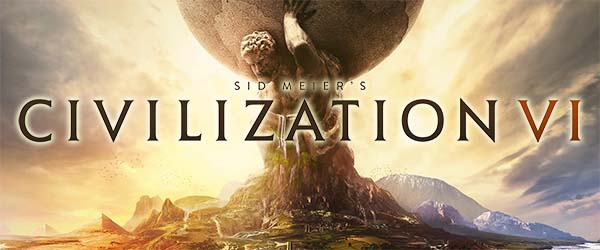
With the New Frontiers Pass for Civ VI over, an "Anthology" edition of Civ VI on sale, and no news at all regarding future DLC or expansions, I'm assuming that Firaxis has finished with Civ VI. As such, I want to look back on the game and reflect on the things that I liked most about it, and the things that annoyed me the most.
After the lifespan of Civilization V had ended, I wrote up a pair of retrospective blogs about my personal Top 10 Good Ideas and Top 10 Bad Ideas that went into that game. I'll be doing the same thing now with Civ VI.
I want to stress that this is a list of 10 good and bad ideas -- not necessarily good and bad mechanics. Some of the good ideas will be ideas that I like in principle (or on paper), but which might need more iteration before they truly work as intended. In contrast, there may be some bad ideas that work fine mechanically, but which hurt the "flavor" or theming of the game, in my opinion.
This is, of course, a subjective list of personal favorite and disliked concepts in the game. I'm sure there will be a lot of disagreement, and some of the things I write here will probably be somewhat controversial with the rest of the player base. So I'm interested in reading others' feedback. So if you agree with any of my points, or you vehemently disagree, feel free to post a comment and share your thoughts.
This content is also available in video essay format via YouTube.
This first post will cover my personal Top 10 Good Ideas, and I will follow it up with the next post being about the Top 10 Bad Ideas. [More]
549df3d2-8086-446d-bb11-35103ccef5b9|1|5.0
Tags:Civilization VI, Civilization VI: Rise and Fall, Civilization VI: Gathering Storm, Civilization VI: New Frontiers Pass, Sid Meier's Civilization, retrospective, top 10, music, Christopher Tin, Baba Yetu, agenda, wall, scout, skirmisher, ranger, diplomacy, alliance, disaster, climate change, barbarian, city state, leader
An interesting and sickening piece of political video gaming news came out last week. I had meant to write about it at the time, but got bogged down with some personal and family obligations. Nevertheless, I wanted to throw in my two cents.
Activision / Blizzard has apparently banned a professional Hearthstone player, living in Hong Kong (a semi-sovereign city-state in China), from participating in professional e-sports. The reason that Activision / Blizzard banned Ng Wai Chung (who goes by the username Blitzchung) is because he made statements in support of a decades-long protest movement in Hong Kong that supports independent democracy. The authoritarian communist Chinese government has been battling pro-democracy protests in Hong Kong for decades, and apparently video game publishers (among many other American corporations) are starting to act as shills for China's policies of repression and censorship.
Heck, Activision even went one step further, and rescinded the prize money that Blitzchung had already won! They also stated that they are canceling professional relationships with the Taiwanese reporters who were interviewing Blitzchung when he made the comment. Taiwan, by the way, also has a lengthy history of Chinese repression.
Blitzchung made his comments as a part of an official Twitch stream, and Activision claims that his statements violated tournament rules that prohibit any speech that would:
"... brings you into public disrepute, offends a portion or group of the public, or otherwise damages Blizzard image."
Apparently, speaking out against Chinese government repression and tyranny counts as "damaging the image of Blizzard". But Blitzchung isn't an employee or agent of Activision / Blizzard, and his statements had nothing to do with Activision / Blizzard as a business. Blitzchung's comments weren't hate speech, they weren't inciting riots or violence, nor was the statement itself anything that is actually offensive (to anyone other than the Chinese government). Would Blizzard have reacted similarly had a tournament player said "Trump, 2020" or "LGBTQ rights" or anything that could be seen as similarly divisive? If they had, they'd be equally as wrong to do so.
Activision / Blizzard's reaction is disgusting and reprehensible. I'm sure they want to increase their market penetration in China, and having players of their games who live under that repressive Chinese government speaking out against the repressive Chinese government probably doesn't make Activision / Blizzard look good in the eyes of the Chinese government. But so what?! By not taking a stance in favor of free speech, Activision / Blizzard is enabling and condoning a tyranny that would squash the very free markets in which Activision / Blizzard operates and earns its vast amounts of wealth.
... [More]
d926e201-8a71-4ae6-925d-1327382712f9|1|5.0
Tags:Activision, Blizzard, Hearthstone, China, censorship, Ng Wai Chung, Blitzchung, Hong Kong, city state, Taiwan, protest, democracy, authoritarianism, totalitarianism, communism, capitalism, Sekiro: Shadows Die Twice, NBA
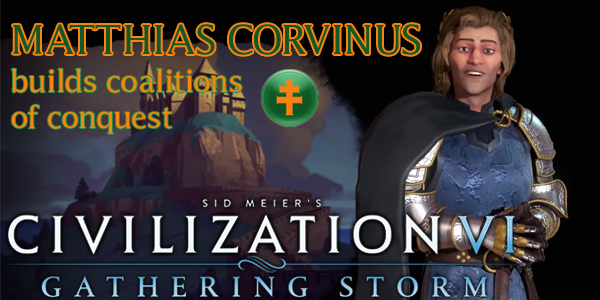
Civilization VI's second expansion, Gathering Storm released earlier this year and has added a handful of new civilizations and leaders. I am hoping to write a strategy for each of them, but I want to start with the civilizations and leaders who are completely new to the franchise. This time, I'll be writing about the last of the truly new civs and leaders: the kingdom of Hungary, lead by the Raven King Matthias Corvinus.
Hungary is a modestly-sized country that lies along the dividing lines between central and eastern Europe, known for its vast geothermal water cave network. It reached its political and military height between the 14th and 15th centuries, when it became a major player in European politics and history. When the Ottomans invaded Europe in the mid-15th century, they set their eyes on securing a valuable border fortress at Belgrade. A noble from Transylvania, named John Hunyadi, levied a mercenary army to defend Belgrade from the Turks and hold back the Ottoman army from successfully gaining a foothold in mainland Europe.

The golden age of the Hungarian Kingdom concluded with the rule of the Raven King Matthias Corvinus, son of John Hunyadi. His election made him the first noble to ascend to the throne without a dynastic background. He was a patron of arts and education, and was seen as a protector of the common folk. His Bibliotheca Corvinian was the second largest library in all of Europe in the 15th century, second only to the Vatican Library. Matthias' mercenary Black Army fought off invasions from the Ottomans (possibly helping to protect all of Europe from Ottoman rule), and also conquered parts of Austria and Bohemia. When Matthias died without an heir, the country fell into decline.
DISCLAIMER:
Civilization VI is still a "living game". Strategies for the game (and for specific leaders and civs) may change as Firaxis applies balance patches, introduces new features, or expands the game through further DLC or expansion packs, or as the Civ community discovers new strategies or exploits. As such, the following strategy guide may change from time to time. I will try to keep it up-to-date, and will make notations whenever changes are made. I'll also post links in the official 2K forums and CivFanatics, where I'll also report any changes made. If possible and practical, I will try to retain the original content of the strategy for posterity.
I welcome any feedback or suggestions that readers wish to offer. Feel free to post on the linked forums, or by posting a comment at the bottom of the page.
This guide is up to date as of the release of the Gathering Storm expansion's "June 2019 update" (ver. 1.0.0.328)
Hungarian cities in Civilization VI do best when founded on snaky rivers and near geothermal fissures. They can be a military force to be reckoned with thanks to a pair of light cavalry unique units and a leader who can use levied city state units to crush his foes.
... [More]
a0bef8e7-e5fc-4a5a-a716-f599f93d6165|2|5.0
Tags:Sid Meier's Civilization, Civilization VI, Civilization VI: Gathering Storm, Hungary, Matthias Corvinus, pearl of the Danube, raven king, thermal bath, huszar, black army, horse, geothermal fissure, river, district, city state, levy
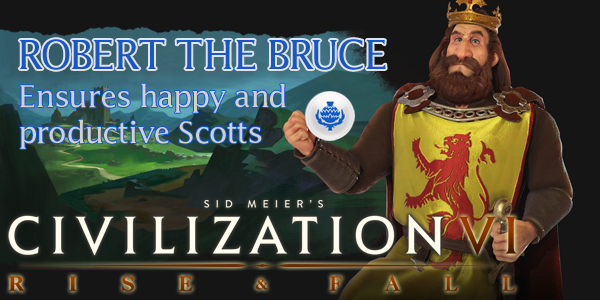
Civilization VI's second expansion, Gathering Storm was announced earlier this year, and will be released in a couple months. It will include modified rules and new civilizations, and I'll certainly be writing some guides for its new civilizations. In the meantime, however, I'm going to tackle one more civilization from the previous Rise & Fall expansion. This civilization happens to be the last of the "new" civilizations (a civ that has never appeared in a previous game): Scotland, lead by Robert the Bruce.

Scotland is currently a part of the United Kingdom, and makes up the northern third of the British isle. However, Scotland was an independent, sovereign kingdom throughout most of the Middle Ages. The lands of Scotland are shaped predominantly by receding glaciers during the tail end of the last ice age, and the area has been inhabited for over twelve thousand years. The Scottish Gaels strongly resisted Roman encroachment into their territory during the first and second centuries. Their raids on Roman forts forced emperor Hadrian to construct a defensive wall over 117 km long and as tall as 6 meters, that ran almost the entire width of the island. Parts of the wall still stand across England today. After the withdrawl of the Romans, the kingdom of the Picts became known as the kingdom of Alba, which flourished in the 12th and 14th centuries, possessing some of Europe's most influential philosophers.
In 1295, when Scotland's King John had refused to fight alongside England's King Edward against the French -- despite Edward having arbitrated the Scottish crown to John -- England and Scotland were plunged into war that resulted in England seizing control over Scotland. In the early 14th century, new Scottish King Robert the Bruce began a 20-year campaign against the English to restore Scottish independence. Victory at the battle of Bannockburn finally restored control of Scotland back to the Scotts, and conflict between England and Scotland continued off and on for many generations before the two countries were united diplomatically in 1707.
DISCLAIMER:
Civilization VI is still a "living game". Strategies for the game (and for specific leaders and civs) may change as Firaxis applies balance patches, introduces new features, or expands the game through further DLC or expansion packs, or as the Civ community discovers new strategies or exploits. As such, the following strategy guide may change from time to time. I will try to keep it up-to-date, and will make notations whenever changes are made. I'll also post links in the official 2K forums and CivFanatics, where I'll also report any changes made. If possible and practical, I will try to retain the original content of the strategy for posterity.
I welcome any feedback or suggestions that readers wish to offer. Feel free to post on the linked forums, or by posting a comment at the bottom of the page.
This guide is up to date as of the November 2018 "launcher" patch (ver. 1.0.0.262)
Scotland is another "world police" civ (similar to Australia). It can also hold its own and can become a technological and/or industrial powerhouse if its citizens remain happy.
[More]
4aff6e58-76c7-40e2-879e-064cb4e5c5c2|0|.0
Tags:Sid Meier's Civilization, Civilization VI, Civilization VI: Rise and Fall, Scotland, Scottish Enlightenment, Robert the Bruce, Bannockburn, golf course, highlander, flower of Scotland, ranger, amenity, happiness, housing, science, production, culture, war of liberation, casus beli, alliance, city state, unique improvement, unique ranged unit
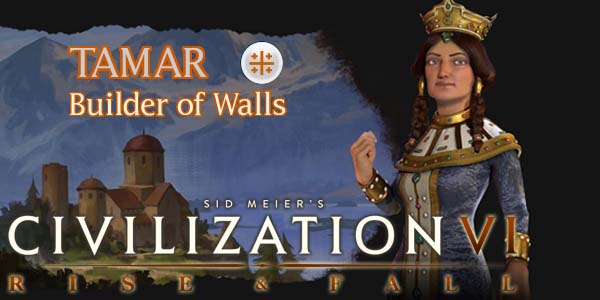
Civilization VI's first expansion, Rise & Fall released a couple months ago, and it introduced a few leaders and civilizations that are making their first appearance in the franchise. I hope to be able to write strategies for every one of the expansion civs and leaders, but I'm going to start with the ones that are new to the franchise, and the ones that most utilize the expansion's new features (Era Score, governors, loyalty, and so on). The first civilization that I will tackle will be the Georgian civilization, lead by Queen Tamar.
The feuding Georgian kingdoms in the Caucusus were first united under Bagrat III between 1008 and 1010 AD, after he tricked his cousins (the heads of feuding houses) into a false reconciliatory meeting, only to throw them into prison and ensure that his son would become heir to the kingdom. A few years later, however, that son would become a prisoner of the Byzantines as part of a peace deal after Bagrat's failed attempt to reclaim the ancestral city of Tao from the Eastern Roman Empire.
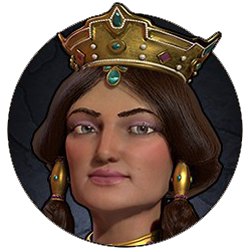
The Georgian empire reached its height under the rules of King David IV and Queen Tamar in the 12th and 13th centuries. These monarchs took advantage of the decline in Byzantine power and filled the power vacuum by claiming lands lost by the Byzantines. During this time, art and literature flourished, and Georgia developed its own architectural styles. Ecclesiastic art was dominant, but this period also saw some of the first major secular works of art and literature. This period would eventually become known as the Georgian Renaissance (or "Eastern Renaissance"). The renaissance continued under Tamar's rule, who proved adept at statecraft. She mediated internal tensions within her kingdom, and even thwarted a coup by her Russian husband, all the while protecting her kingdom from Turkish invasions and claiming Muslim lands to the east and south.
The Kingdom of Georgia's golden age would eventually come to an end at the hands of invading Mongols in the 13th century. The kingdom would be fractured, and the ensuing Black Death would ensure that Georgia would never again reach its former glory.
DISCLAIMER:
Civilization VI is still very early in its life-cycle (particularly the Rise & Fall expansion. Strategies for the game (and for specific leaders and civs) may change as Firaxis applies balance patches, introduces new features, or expands the game through further DLC or expansion packs, or as the Civ community discovers new strategies or exploits. As such, the following strategy guide may change from time to time. I will try to keep it up-to-date, and will make notations whenever changes are made. I'll also post links in the official 2K forums and CivFanatics, where I'll also report any changes made. If possible and practical, I will try to retain the original content of the strategy for posterity.
I welcome any feedback or suggestions that readers wish to offer. Feel free to post on the linked forums, or by posting a comment at the bottom of the page.
This guide is up to date as of the March 2018 patch (ver. 1.0.0.229)
In Civilization VI: Rise & Fall, Georgia is a defensive and religious civilization that thrives in its golden ages. Tamar is a bit of a religious world policewoman who builds strong relationships with city states that share her faith, and who will aggressively protect her city state allies. [More]
851c8f8a-f6ab-4afc-92d8-5eafc6a09aa4|0|.0
Tags:Sid Meier's Civilization, Civilization VI, Georgia, Tamar, strength in unity, glory of the world kingdom and faith, Narikala Fotress, Tsikhe, Khevsur, protectorate war, casus beli, city state, suzerain, envoy, religion, faith, golden age, era score, unique building, unique melee unit
|

| 12 | | | | | | | 60 | | 11 | | | | | | | 55 | | 10 | | | | | | | 50 | | 09 | | | | | | | 45 | | 08 | | | | | | | 40 | | 07 | | | | | | | 35 | | 06 | | | | | | | 30 | | 05 | | | | | | | 25 | | 04 | | | | | | | 20 | | 03 | | | | | | | 15 | | 02 | | | | | | | 10 | | 01 | | | | | | | 05 |
|